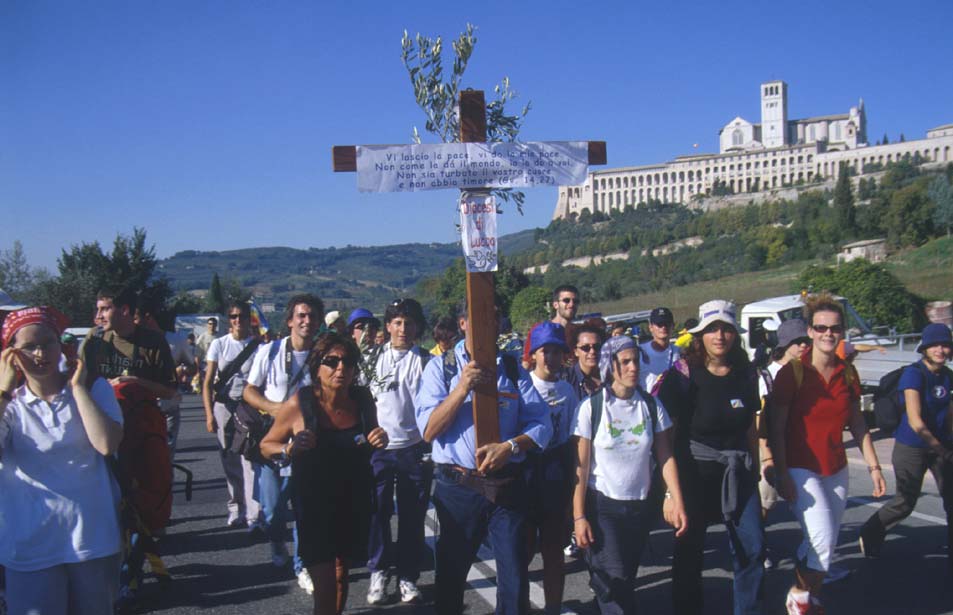editorial" "
” “Numerous interreligious meetings in the dioceses accompanied” “the Day of prayer for peace: the "spirit of Assisi" is spreading ” “

If one were to link the bloody events of the Middle East with the Day of prayer for peace in Assisi, one might be tempted to reach the conclusion that it was a failure. Some have not hesitated to point out that, two days previously, all the absent guests at Assisi those involved in the conflict in the Holy Land were conspicuously present at Alexandria at the invitation of the Anglican primate, George Carey, to attempt to open a dialogue between religious leaders that is impossible to open between politicians at the present time. But the objectives of these meetings were not the same, at least in the short term. The urgent need to resolve as soon as possible the crisis in the Middle East does not make the interreligious intervention promoted by John Paul II useless. Made indispensable by the current situation, this intervention forms part of a longer-term process that concerns the whole world and aims at a profound change in mentality. From this point of view, what happened at the Assisi meeting may already tell us a great deal about the profound impact this initiative is having and enable us to gauge the progress made since 1986, when such an interreligious summit was still an absolute novelty for the mass media. For example, in France, the day of peace mobilized Catholics in particular who, it should be pointed out, have not always been so responsive to initiatives of interreligious dialogue, or meetings with those of other faiths; this is undoubtedly the result of fifteen years of patient work in the promotion of peace ever since Assisi 1986. Moreover, it should be recalled that on 24 January numerous interreligious meetings in the dioceses accompanied the one in Assisi. In this sense, the initiative taken by the European Jewish Congress to organize a high-level meeting between Jews and Catholics in Paris on 28 and 29 January is important. The participants included Cardinals Kasper, Lustiger and Schönborn (cf. the report below, page 10) . The novelty of the event consists in the fact that the initiative to hold the meeting came from the Jewish side: “we wish to pay homage to the Pope for his dialogue with the Jewish world”, explained Serge Cwajgenbaum, secretary general of the European Jewish Congress, in speaking to the French Catholic daily “La Croix”. These words sound like a victory of the spirit of Assisi. The idea that religions must never be sources of war is spreading. There is still a long way to go before it is recognized by everyone, but meetings like the one in Assisi help to make it more difficult to manipulate the faith of believers for aggressive or unjust purposes. Without wishing to deceive ourselves about their immediate impact, all the gestures that reflect the spirit of Assisi deserve to be welcomed as so many steps forwards. It is very significant that the day before the event in Assisi, the grand mufti of Tunisia wrote to the bishop of Tunis: “we condemn terrorism: Islam is for peace”. And when people pray simultaneously during interreligious meetings in Buenos Aires, Moscow, Manila or Dakar, that is an added building block in a construction that requires patience. When, in the immediate aftermath of the second world war, men including some who had come straight out of the concentration camps devoted their energies to Franco-German reconciliation, they progressed in the same way, step by step, by small gestures such as twinning cities of the two countries, or exchanging visits of students, sportsmen, choirs, firemen. And, bit by bit, the idea of yet another Franco-German war evaporatedr. John Paul II does not aim to achieve the unanimity of religions. Meetings like the one in Assisi do not claim to establish the United Nations of faith, still less to find political solutions to every conflict that bedevils the planet. The point is to know whether the lesson of peace may become a common good of all religions. The Pope is working towards the objective that religions no longer be sources of war. It’s enough to look at the world to realize that so much still needs to be done, and that other Assisi meetings, and other initiatives sponsored by other religious exponents, will be needed. In this sense, those who have the task of diffusing information may themselves contribute to promoting peace, by showing themselves less disillusioned. There’s a time for spectacular gestures, but time and perseverance are needed if spirits are ever to change.